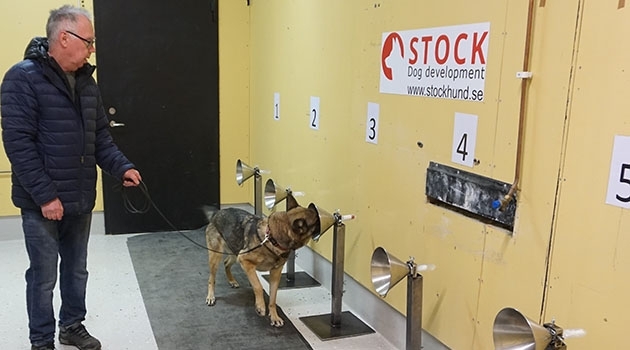Dogs helping to diagnose COVID-19
Uppsala University and Region Uppsala are now starting a research project in collaboration with Hundhjälpen in Uppland and Stock Hundutveckling to investigate whether dogs can help diagnose COVID-19.
Dogs have a highly developed sense of smell, and previous research has shown promising results for dogs trained to identify individuals with illnesses, such as specific bacterial infections, cancer and low blood sugar. Research teams around the world are now investigating whether dogs can be trained to detect scent samples coming from people with COVID-19. Several of these studies have shown positive results.
Uppsala University is now conducting a study together with the academic health centres and local medical test centres in Region Uppsala, where they collect scent samples consisting of compresses wiped across the skin on necks of people with and without COVID-19. The scent samples will be used to train dogs to detect COVID-19.
Three months of training
The training of several different dog breeds is expected to take up to three months and will be led by Hundhjälpen in Uppland, a dog day care centre, and Stock Hundutveckling. The researchers will monitor the training of dogs and then evaluate the results. Before the training programme starts, the dogs are tested to ensure they can perform the task and that they perceive the training as positive.
“We are in great need of tests that can quickly show if a person has COVID-19. It will be very exciting to follow the training of the dogs and see if they become good enough at distinguishing positive from negative samples,” says Tove Fall, a professor of molecular epidemiology and head of research for the study.
The samples for training the dogs will be collected from people tested for an ongoing COVID-19 infection and from symptom-free people visiting primary health care. The dogs will be trained with the scent samples separately and will not be present when samples are collected during their training. The dogs will be rewarded when they detect samples that come from individuals with COVID-19 and learn how to signal that they recognise the scent.
Small risk of dogs becoming infected
After completing the training programme, the dogs’ performance will be evaluated using scent samples where neither the guide nor the dog knows the test results. Based on previous studies, the risk of the dogs being infected is considered to be very small.
“Depending on the results, the dogs that have undergone the training can then be used in the community to detect COVID-19 in people at locations such train stations, airports, other places with large numbers of people and in health care settings. Allowing dogs to do an initial screening can be an effective and fast method of detecting COVID-19. For example, you save a lot of time and resources by not administering a polymerase chain reaction (PCR) test to everyone but instead only to those individuals whose scent samples the dog has identified,” says Mats Martinell, medical manager at the sampling unit in Region Uppsala.
The study can serve as a model for quickly training more dogs during the coronavirus pandemic and be used in the future for early training of dogs in case of a new pandemic outbreak.
Annica Hulth

